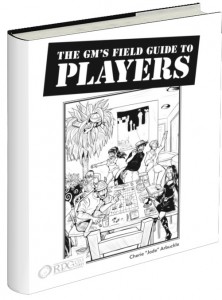The Rules Lawyer
This sub-class of the Mechanic finds great joy in being the “go-to” guy. He’s probably memorized half (if not all) the books the group uses, and then some. While some Rules Lawyers have a strong emotional stake in being right all the time, many more of them just like being helpful. They often see themselves as much a game resource as the books they’ve memorized. Why should the GM have to spend 20 minutes page-flipping to find the special-case rule? Just ask the local Rules Lawyer: he’ll have the answer for you in less than a minute. If he doesn’t know the answer off the top of his head, he knows exactly where to find it.
Virtues
This player is walking rulebook. Use that information to your advantage. Don’t be afraid to ask the Rules-Lawyer about a rule you may be unsure of. Like all of us, Rules Lawyers need to feel needed. They also make great mentors to players trying to learn the ins-and-outs of a new system.
Flaws
The rulebook is the law of the land to a Rules Lawyer. He will argue incessantly with the GM over a rule change. A GM who has a Rules-Lawyer in the group will need to make it clear that she, not the rulebooks, is the ultimate authority of her game. If the GM views the rules as guidelines, rather than holy commandments, she needs to make that clear to the rules-Lawyer before the first game session (and often repeatedly throughout the campaign).
Rules Lawyers can also get bogged down in obscure modifiers and rare special cases. They may need reminding that you don’t need to use everything in the system, just because it’s printed in the book. (Unless you want to, in which case you’ll find the Rules Lawyer an even more valuable resource).
Ways a Rules-Lawyer can be useful
Out of Character:
- As a researcher: if you know you’re going to need some section of the rules you don’t normally use, ask your resident Rules Lawyer to research them for you and make a cheat-sheet you to use at the next game session.
- As a mentor: pair the Rules Lawyer up with a player who’s new to this game system. That player will get a good grounding in the system’s mechanics–which is always helpful, even if the new person is a Character Actor. Just keep an eye on things and remind the mentor to keep to the basics of the system and not overwhelm his new student with too much detail and crunch.
- As a devil’s advocate: if another player suggests a rules addition or modification, have her run it by the Rules Lawyer for analysis. He can give you a break down of the advantages or disadvantages of the suggestion and a thorough description of the effect it’s likely to have on the rest of the game’s mechanics.
- As a creation assistant: Because Rules Lawyers know the mechanics of character creation extremely well, you can give a character description to a Rules Lawyer and let them work out the mechanics of it. Just make him aware that you’ll be making some changes to his work, so that he doesn’t know everything about that NPC’s powers and abilities.
(I did this frequently with a player in one campaign I ran. I’d write out in words what I wanted the character to be like, pass her to my resident Mechanic and he’d figure out all her stats, powers, and special abilities. I’d then make some changes to what he did to keep mystery involved. Balancing mechanics isn’t my strong suit, so I sought out players who are. It saved me a lot of time and I ended up with more mechanically-sound NPCs than I would’ve if I’d done it all myself.)
In Character:
Rules Lawyers tend to have a difficult time with the concept of in-character/out-of-character. Like the Power Gamer, most characters create by Rules Lawyers tend to be primarily collections of stats and powers, rather than a fully-developed personae. Just accept that you’re dealing with a vicarious player and don’t try to force them to develop acting ability.
(This is an excerpt from my upcoming book The GM’s Field Guide to Players. The book goes into much more detail about a variety of player types and suggestions on how to work with them during a game. It’s tentatively scheduled for release in late November of this year).
[Image courtesy of shawnzrossi via Flickr Creative Commons]
 Have Player Troubles?
Have Player Troubles?








